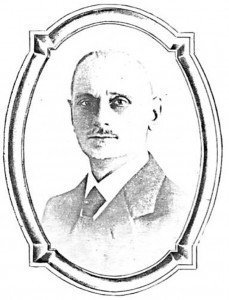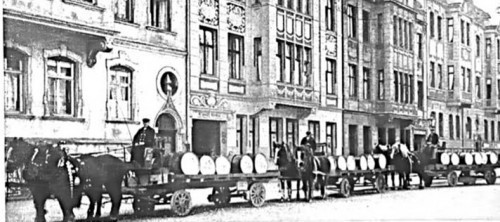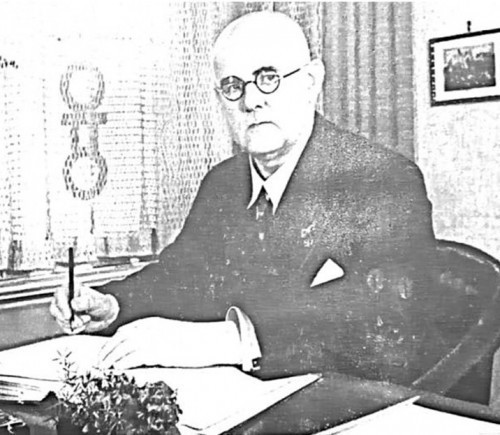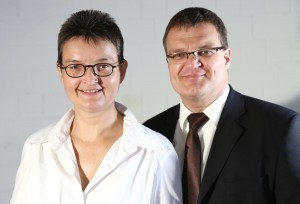Emil Otto Flux- und Oberflächentechnik GmbH can look back on 120 years of existence these days. This means that the company chronicle also reflects recent German history in all its facets.
1901
 Company founder Emil OttoTheNobel Prizes are awarded forthe first time. Conrad Röntgen receives the Physics Prize, Emil von Behring the Medicine Prize. The II Orthographic Conference establishes binding spelling rules with the participation of Konrad Duden.
Company founder Emil OttoTheNobel Prizes are awarded forthe first time. Conrad Röntgen receives the Physics Prize, Emil von Behring the Medicine Prize. The II Orthographic Conference establishes binding spelling rules with the participation of Konrad Duden.
"Agility is the order of the day!" said Emil Otto when he founded his eponymous company in Magdeburg on January 6 (his 40th birthday). Back then, at the turn of the 19th and 20th centuries, the capital of Saxony-Anhalt was developing into the center of German heavy machinery and plant engineering. Companies such as Krupp-Gruson and Buckau Wolf had a high demand for process-supporting chemical additives. In addition to drilling oils, pickling and polishing agents, fluxes for soft and hard soldering of ferrous materials, copper and brass were also in demand. Emil Otto developed and produced a wide range of chemicals, with fluxes being the main focus. Nevertheless, Emil Otto could not have foreseen at the time that his company would still be in existence after 120 years in the fifth generation.
Even as a child, Otto was a true inventor. When, as an apprentice plumber, he was exposed to harmful hydrochloric acid vapors while soldering, he decided to develop an atoxic solder. A goal that he would not lose sight of. The basic product of his new venture was initially an aid for protecting and maintaining the collectors of electrical direct current machines. 'Otto's collector solder' gained enormous importance, especially during the development years of electricity.
But soldering workers still suffered serious health problems from the fumes of hydrochloric acid. Emil Otto continued to research alternatives. When he finally succeeded in bringing usable products onto the market, plumbing companies and metal goods factories were enthusiastic. He himself concentrated on producing further soldering oils, soldering greases and soldering pastes in a variety of forms for many applications. His son-in-law Paul Faßbender, who had recently joined the company, distributed the products far beyond Germany to Austria, Hungary, France and Switzerland. To this day, Emil Otto GmbH claims to be the only manufacturer in the world to produce and supply fluxes in concentrate and powder form.
1922
Germany and Russia sign the Rapallo Treaty. The Polish Corridor causes a stir in Germany. With "Nosferatu - Symphony of Horror", the first horror shocker is released in cinemas.
On November 14, 1922, Emil Otto hands over the management of the company to his son-in-law Paul Faßbender for health reasons. He steered the company through the Second World War. Even the destruction of the production buildings after a bombing raid on January 16, 1945 did not discourage the new company owner and his wife. Instead, they continued production provisionally in the remaining cellar rooms until the production facility was rebuilt.
 Major order in 1929: A load of high-gloss tin is delivered - the delivery vans only have 2 hp
Major order in 1929: A load of high-gloss tin is delivered - the delivery vans only have 2 hp
 Paul Faßbender, Otto's son-in-law, led the company through the Second World War
Paul Faßbender, Otto's son-in-law, led the company through the Second World War
1949
The Federal Republic of Germany, the German Democratic Republic and the People's Republic of China are founded. "Raisin bombers" supply Berlin during the Berlin crisis. The founding of NATO deepens the division of Europe, and the East responds by founding the Warsaw Pact. Europe is divided in two, the Cold War takes its course and lasts for 40 years.
After the division of Germany, which was finally completed with the constitution of the GDR that came into force on October 7, 1949, the company management had to deal with the next blow in 1957. Like almost all companies in the GDR at the time, Emil Otto was converted into a semi-state limited partnership and initially continued to be run with 50% private and 50% state capital. The grandson of the company founder therefore decided to move to Hamburg. There he opened a branch of the Emil Otto company. Before the construction of the Berlin Wall in 1961 cemented the final division of Germany and thus the separation of the company, other partners from the founding family moved to Hamburg. At the current site in Erbach (Eltville), they acquired a factory that had previously been used as a canning plant, which they converted into a chemical production facility.
1989
Things are boiling in the GDR. Citizens demonstrate on the streets. Numerous people take refuge in West German embassies (known as Prague). The Monday demonstrations begin. The Wall comes down on November 9.
However, the private shareholders remaining at the Magdeburg site lost their company shares in 1972. By law, the GDR leadership had decided to transform medium-sized industry into state-owned enterprises (VEB). Emil Otto KG thus became VEB Löt- und Poliermittelwerk with a further site in Berlin. Central tasks such as application research, quality assurance and the central library were managed by a specialist group management company, VEB Härtol. It was not until the fall of the Berlin Wall in 1989 and the subsequent reunification of the two German states that it was possible to unbundle the Härtol combine and return the shares of the formerly independent Emil Otto company to the former owner family. To this end, the heirs' association EMOPOL Flux- und Oberflächentechnik GmbH was set up under the management of Michael Leitreuter and Dr. Heinz Herzog. The company was continued under certain conditions and the workforce was kept on for years to come. After the death of Heinz Herzog, Michael Leitreuter succeeded in unraveling the community of heirs and reuniting the Emil Otto company. A serious illness finally forced Michael Leitreuter to convert the company into a limited company.
Since his death in 2014, his daughter Barbara and her husband Markus Geßner have continued to run the Emil Otto company in the fifth generation. They are currently building up new marketing and sales structures based on close contacts with customers, institutes, research facilities and plant manufacturers. The aim is to continue to align the product range with the requirements of the modern electronics industry.
2021
A mysterious virus has triggered a pandemic for a year now. Numerous fundamental rights (freedom of expression and travel, inviolability of the home, etc.) have been suspended. The economy, especially small businesses, is groaning under restrictions.
Despite all the adversity, Emil Otto was able to keep pace with technological change. As a leader in innovation and quality, the experts have actively supported and shaped the switch to lead-free soldering processes, the development of selective soldering processes and environmentally friendly water-based flux. Emil Otto is currently also increasingly focusing on products for toolmaking and mechanical engineering, hard and soft soldering and the areas of radiator construction and strip tinning. They will also be adding new cleaning media and SMD adhesives to the portfolio. Of course, Emil Otto's eventful company history shows that some circumstances cannot be influenced. The current pandemic clearly demonstrates this. Nevertheless, the experts are confident that the best is yet to come!
Emil Otto Flux- und Oberflächentechnik GmbH today
 Barbara and Markus Geßner run the company today. Barbara is a direct descendant of the company founderThename "Emil Otto" has been synonymous with the development and manufacture of high-quality fluxes since 1901. In particular, the fluxes for electronics production, strip tinning, radiator construction and galvanizing are used by many market leaders worldwide. Production is carried out according to the latest standards, and quality and environmental management has been certified for many years. Special products or product adaptations are developed and implemented in cooperation with plant manufacturers and institutes.
Barbara and Markus Geßner run the company today. Barbara is a direct descendant of the company founderThename "Emil Otto" has been synonymous with the development and manufacture of high-quality fluxes since 1901. In particular, the fluxes for electronics production, strip tinning, radiator construction and galvanizing are used by many market leaders worldwide. Production is carried out according to the latest standards, and quality and environmental management has been certified for many years. Special products or product adaptations are developed and implemented in cooperation with plant manufacturers and institutes.


